
This edition first published 2013
2013 John Wiley & Sons Inc.
Wiley-Blackwell is an imprint of John Wiley & Sons, formed by the merger of Wiley's global Scientific, Technical and Medical business with Blackwell Publishing.
Registered Office
John Wiley & Sons Ltd, The Atrium, Southern Gate, Chichester, West Sussex, PO19 8SQ, UK
Editorial Offices
350 Main Street, Malden, MA 02148-5020, USA
9600 Garsington Road, Oxford, OX4 2DQ, UK
The Atrium, Southern Gate, Chichester, West Sussex, PO19 8SQ, UK
For details of our global editorial offices, for customer services, and for information about how to apply for permission to reuse the copyright material in this book please see our website at www.wiley.com/wiley-blackwell.
The right of Russell Blackford and Udo Sch klenk to be identified as the authors of this work has been asserted in accordance with the UK Copyright, Designs and Patents Act 1988.
klenk to be identified as the authors of this work has been asserted in accordance with the UK Copyright, Designs and Patents Act 1988.
All rights reserved. No part of this publication may be reproduced, stored in a retrieval system, or transmitted, in any form or by any means, electronic, mechanical, photocopying, recording or otherwise, except as permitted by the UK Copyright, Designs and Patents Act 1988, without the prior permission of the publisher.
Wiley also publishes its books in a variety of electronic formats. Some content that appears in print may not be available in electronic books.
Designations used by companies to distinguish their products are often claimed as trademarks. All brand names and product names used in this book are trade names, service marks, trademarks or registered trademarks of their respective owners. The publisher is not associated with any product or vendor mentioned in this book.
Limit of Liability/Disclaimer of Warranty: While the publisher and author(s) have used their best efforts in preparing this book, they make no representations or warranties with respect to the accuracy or completeness of the contents of this book and specifically disclaim any implied warranties of merchantability or fitness for a particular purpose. It is sold on the understanding that the publisher is not engaged in rendering professional services and neither the publisher nor the author shall be liable for damages arising herefrom. If professional advice or other expert assistance is required, the services of a competent professional should be sought.
Library of Congress Cataloging-in-Publication Data
Blackford, Russell, 1954
50 great myths about atheism / Russell Blackford, Udo Sch klenk. 1 [edition].
klenk. 1 [edition].
pages cm
Includes bibliographical references and index.
ISBN 978-0-470-67404-8 (cloth : alk. paper) ISBN 978-0-470-67405-5 (pbk. : alk. paper) 1. Atheism Miscellanea. I. Title. II. Title: Fifty great myths about atheism.
BL2747.3.B575 2013
211.8 dc22
2013006626
A catalogue record for this book is available from the British Library.
Cover design by Simon Levy, www.simonlevy.co.uk
Acknowledgments
We wish to acknowledge assistance from Ophelia Benson, Jenny Blackford, Robert Brookey, Jerry Coyne, Darragh Hare, Tauriq Moosa, Antonio Marturano, Nikoo Najand, Graham Oppy, Jacques Rousseau, Grania Spingies, Naomi Stekelenburg, and Peter Sy. All offered us their favorite myths about atheism, and some went beyond this with other valued assistance or advice. In particular, Professors Coyne and Oppy gave valued comments on an earlier draft of the chapter entitled The Rise of Modern Atheism.
The following Queen's University students provided us with valuable research assistance at different times during this project: Monica Joshi, Geoff Mason, Brendan McCreary, Nikoo Najand, Matthew Pike, and Eamon Quinn.
We also thank the originator of the Jesus and Mo cartoons featured in this volume for his generous permission to use his wonderful art work.
We owe a particular debt of gratitude to our copy-editor Jenny Roberts, whose rigor, skill, and eye for detail saved us from numerous infelicities and errors (we take full responsibility for those that remain).
Last but by no means least, Jeff Dean, our then editor at Wiley-Blackwell, approached us with the idea for this book. In a way it owes its very existence to him.
Introduction
Atheism is responsible for Stalin, Hitler, and Pol Pot's genocides.
Atheists have no values.
Atheism is just another religion.
No doubt you will have heard such statements about atheism and atheists, in this or some closely related form or shape. All of them are false, just like many others. And yet they have managed to persist remarkably well over time.
The attacks on atheism are often driven by strong emotions, perhaps because atheism threatens values associated with religion (at least in the minds of the attackers). Thus atheists receive a barrage of questions such as the following:
Without god, what is left of morality? Without god, what purpose is there in man's life? If we do not believe in god, how can we be certain of anything? If god does not exist, whom can we turn to in a time of crisis? If there is no afterlife, who will reward virtue and punish injustice? Without god, how can we resist the onslaught of atheistic communism? If god does not exist, what becomes of the worth and dignity of each person? Without god, how can man achieve happiness?
(Smith, 1979, p. 6)
There is an old saying about propagandaprobably not a myth (Macdonald, 2007, p. 38)that a falsehood repeated often enough will eventually be taken as truth. This is, of course, likely to be true if those who propagate such falsehoods also control large segments of the mass media. A good example of this circulated in the United States even as we were writing this book. The myth was created that Barack Obama, the US President no less, was not born in the United States and so was illegitimately president of the country, since only natural-born citizens of the United States may serve in that role. The story was repeated time and again in mass media outlets such as Fox News, by wannabe presidential contenders and others with a vested interest in undermining Obama's presidency. Eventually President Obama was forced, in an act unprecedented in US history, to publish his long birth certificate to prove that he was really born in Hawaii, as he had always said.
At the height of this myth-generating campaign, according to one opinion poll, a majority of registered Republican voters in the South of the country declared a belief either that Mr Obama was not born in the United States (28%) or that they did not know what to believe (30%) (Schlesinger, 2011). Even if you give the 30% the benefit of the doubt, about one in three to four registered Republicans in the South bought into the myth. This tells you something about the power that myths hold over a susceptible public.
What is Atheism?
But what is atheism anyway? That is a fair point to raise, and is not without its share of controversy. We will return to certain aspects in the first batch of myths we examine, but here's an overview of our approach.
Even atheists, and the various organizations they have formed, often argue about what the proper atheistic view should be regarding the existence of gods, including the traditional God of Christianity, Islam, and Judaism. Some argue that an atheist is simply a person who does not believe in God. Others claim that an atheist must think that there is incontrovertible proof that God does not exist. Some atheists think that there is nothing that they have to prove at all. They insist that those claiming the existence of a particular god, or a set of gods, need to demonstrate the truth of their claims. Then there are humanists, secularists, and agnostics, and others with their own labels.
Next page
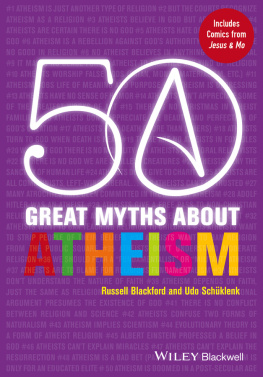
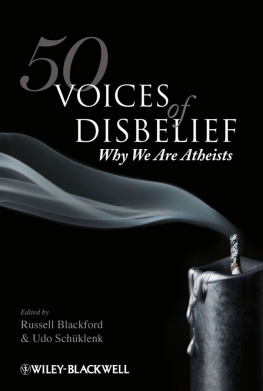
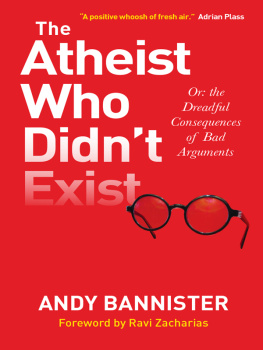
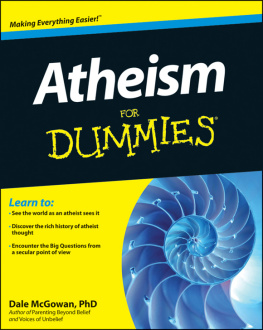
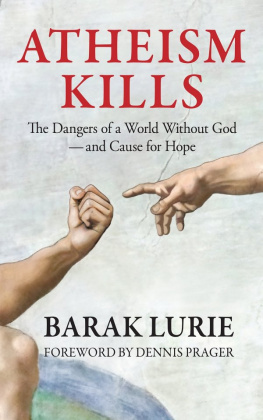
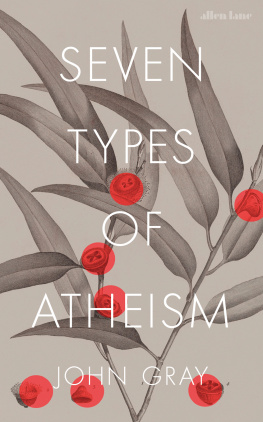

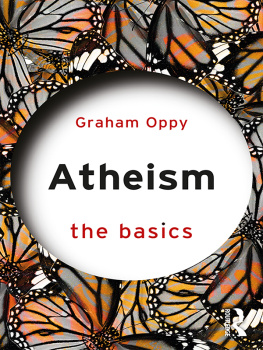
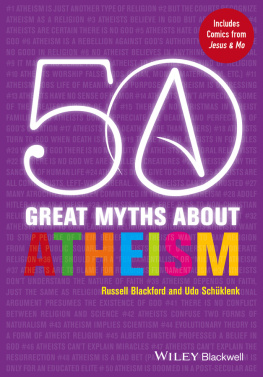
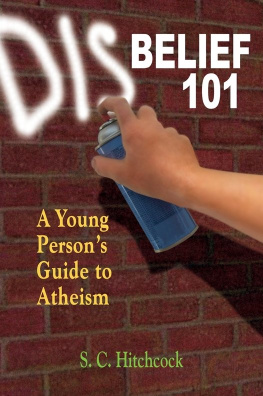

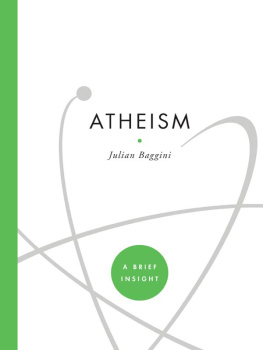

 klenk to be identified as the authors of this work has been asserted in accordance with the UK Copyright, Designs and Patents Act 1988.
klenk to be identified as the authors of this work has been asserted in accordance with the UK Copyright, Designs and Patents Act 1988.